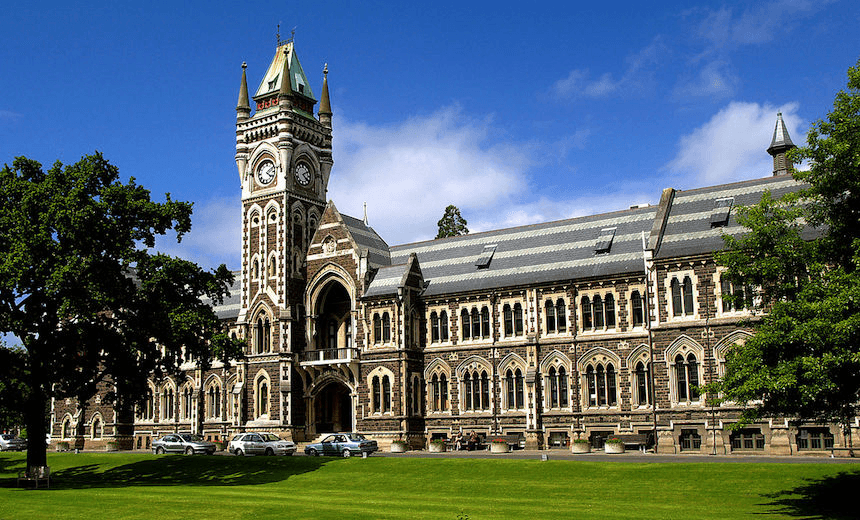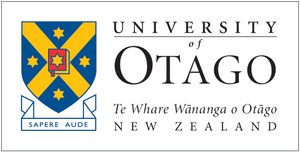When the University of Otago was founded 150 years ago the interests of local Māori were disregarded. But now, in the last 50 years, engagement with tangata whenua has become an essential part of the university’s identity.
New Zealand’s first university was co-founded by a controversial Scottish politician determined to make something of himself in Dunedin’s settler society. James Macandrew is described by historian Dr Ali Clarke as an “entrepreneur and politician of visionary dreams, considerable achievement and frequent failure”, in her new book recounting Macandrew’s role in the founding of the University of Otago in 1869.
Initially, the proposal of a “New Zealand university” was rejected by parliament, Clarke says in Otago: 150 Years of New Zealand’s First University. The decision did little to deter Macandrew, who forged ahead with plans for a university in Dunedin anyway.
Not unlike other colonist attitudes at the time, his bold ambitions allowed little room for tangata whenua. While he was successful in setting up a university, his disregard for Māori remains a black mark on his biography.
“Kāi Tahu whānui [Kāi Tahu people everywhere] were not fans of Macandrew, who headed a provincial government with no sympathy for Māori rights or interests,” Clarke notes.
Those anti-Māori attitudes are a reason why the university hasn’t named any buildings after James Macandrew. Today’s chancellor, Dr Royden Somerville – who has Kāi Tahu whakapapa through his great grandmother – says reflecting on that troubled history is an important part of the sesquicentennial commemorations.
“When the university was first set up, there was an emphasis on equipping people to train as doctors, lawyers and teachers,” he says. “It was very much a product of colonial times.”
While Māori have attended the university since the late 19th century, he believes true acknowledgement of the importance of tangata whenua to Otago has only occurred in the last 50 years or so – a sentiment that’s been borne out by Clarke’s research.
She points to the 1980s and the implementation of equal employment policies as a period of important change for the university. Government funding led to targeted academic recruitment and better support for Māori students. A Māori liaison officer was appointed, and the Māori Centre set up.
“The increasing engagement with Māori led Otago to take note, at last, of its relationship with mana whenua,” Clarke writes.
Comments from Dr Douglas Girvan, registrar of the university from 1975 to 1995, in Clarke’s book reflect the changing attitude of the times. “We were sitting in the midst of a Māori community which had very little contact with the university,” Girvan says. “It became apparent we had to have formal contact.”
In an attempt to move with the times, the university established a board to advise on Māori issues and protocols in 1988. While members of the Māori community and students were included, the board had no real influence. The board’s ineffectiveness was criticised by Dr Ranginui Walker in his Treaty of Waitangi review of the university, in which he recommended the board be replaced with a council which could enact change.
Importantly, Walker set a new focus for the university and its approach to Māori affairs by identifying the need to actually “implement the kaupapa” of the Treaty principles it had in its charter and strategic plan.
Tuari Potiki (Kāi Tahu, Kāti Māmoe, Waitaha), the director of the university’s Office of Māori Development, points to a memorandum of understanding (MOU) signed with Kāi Tahu about the same time as Walker’s review. Potiki says the MOU, which is periodically reviewed and renewed, anchors development of the university’s approach to Māori.
“The first MOU was signed in 1997, and that led to the establishment eventually of this office,” Potiki says.
“It led to the establishment of a Treaty of Waitangi committee, which is a subcommittee of our university council. We also have a Ngāi Tahu representative on the university council. Essentially, it’s meant that Māori are represented at the very top of the organisation.”
Potiki sees the 150th anniversary as an opportunity to reflect on the way attitudes at the university, and across New Zealand, have changed. But it’s also a time to remember the way things once worked, he says.
“It’s an opportunity to remind everyone of the history of the university, which is bound up in the history of the country. We all have different experiences of that. The attitudes that were reflected in the university at different points in time were the attitudes of the country. It’s reminding people of where we’ve come from.”
The university’s approach to Māori, and its understanding of its relationships with iwi and mana whenua, have been particularly heartening in the past 30 years, he says. “I’m really optimistic. It may only be since the 90s that Māori things here have skyrocketed and that we’ve been taken seriously, but we’ve achieved a lot in that time.
“We’re getting a lot of kids now who have come through kōhanga and have been through kura kaupapa. They’re fluent, they’re first-language Māori speakers. That’s challenging the university to have a look at how we do things and how we support students, and that’s a really positive thing.”
Taylor Terekia (Kāi Tahu, Te Aitanga-ā-Māhaki, Ngāti Porou) is the tumuaki for Te Roopū Māori, the Māori Student Association. She began at the university in 2015, and says recognition of Māori students and their needs has improved even in that time. Significantly, this is the first year Te Roopū Māori secured direct funding from the university. Previously, it had been funded as part of the Otago University Students’ Association (OUSA).
“Issues would come about when their funding would get cut, because so would ours,” Terekia says. “We wanted to get funding straight from the university to cut out the middleman, and also to have recognition from the university and OUSA that we stand on our own. We are equal partners.”
Like Potiki and Somerville, she believes the university’s relationship with Māori is a work in progress, one which is led by students. The increasing numbers of Māori students drives the discussion about that relationship in different directions, she says. This year, there are more than 2000 Māori students at the university.
“Last year, the [Te Roopū Māori] executive lobbied for a marae on campus – which was a bit controversial,” Terekia says.
At the time, Terekia’s predecessor Tiana Mihaere said many students, particularly those from the North Island, would feel more comfortable with an on-campus marae. Terekia says conversations about a marae and whare are particularly pertinent to a growing Māori student roll.
“While we are lucky to have a space for Te Roopū Māori, it’s a couple of rooms in one building. Just with the number of students, we’re finding it hard to have a space where we can all be together to run our events or for tauira Māori to be able to be Māori in a Māori space,” Terekia says.
“We’ve had discussions with the university about a whare and it’s been really good.”
Other issues, like increasing cultural competence amongst university staff, also need to be addressed. While staff are often very positive in their desire to introduce more Māori content, or more of a Māori worldview into their course, they still need assistance in making sure it’s done right, Terekia says.
“We have to make sure it’s correct and appropriate – because we’ve had feedback it isn’t always communicated properly.”

